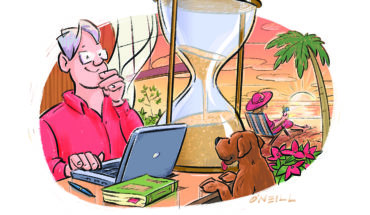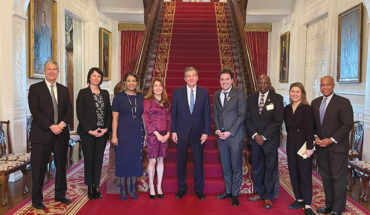
Assad Meymandi in front of Meymandi Concert Hall. “He set out to make Raleigh a 20th – now a 21st – century version of Renaissance Florence,” says Geoffrey Harpham, former president and director of the National Humanities Center. “He wanted a creative home for music and art … His enthusiasms are rich and various, his ideals are high.”
by Liza Roberts
photographs by Jillian Clark
On a sunny afternoon in early December, Assad Meymandi hurried in to the Raleigh concert hall that bears his name. As seats began to fill for the North Carolina Symphony’s matinee performance of Baroque Christmas music, the elegant doctor, philanthropist, and art lover welcomed guests into his private box overlooking the stage. Conductor Paul Agnew’s baton rose, Bach’s triumphant Christmas Oratorio filled the air, and more than 1,000 concert-goers sat back to listen. Assad Meymandi didn’t sit back. Assad Meymandi leaned in.
For more than an hour, he focused intently, read along to the North Carolina Master Chorale’s lyrics in German, and enthusiastically applauded Bach and Handel. Then the 81-year-old leapt to his feet and led a standing ovation for a rousing Brandenburg Concerto No. 4.
“I had synesthesia,” he said urgently, a few moments later. “When I heard the Brandenburg, I thought of the Rumi poem Evolution, and of the Kandinsky painting Black and Violet.”
Music, like so much in Meymandi’s life, isn’t simple. It doesn’t just wash over him, providing beauty, respite, or enjoyment. It connects his dots and fuels his thoughts. And there are many of those.
On any given day, Meymandi’s conversation may range from his ancestral religion of Zoroastrianism to the poetry of Victor Hugo. From the stock market’s Nifty Fifty to Nietzsche’s love of opera. He talks about the roots of benevolence and the singularity of the U.S. Constitution. Spinoza. Epigenetics. The care of the soul. The genius of Mozart. All of it streams as one, his synaptic connections as unexpected and emphatically in-the-moment as the linking of a dark, explosive, abstract 1923 painting to a light, flute-filled 1721 concerto and a 13th-century poem about the oneness of life and death. Some of his thoughts make their way into his weekly Monday Musings blogposts, but even a glancing knowledge of the man makes it clear that those writings represent a fraction of what he has to say.

“He’s at every concert,” says Dovid Friedlander, associate concertmaster with the North Carolina Symphony since 2005 and the Assad Meymandi and Family Chair. “I love seeing him up in his box.” Here, Meymandi can be seen directly above the wreath in the box on the far right.
“He has an incredible mind,” says Dr. Robert Bilbro, a longtime colleague of Meymandi’s and a contributor to Wake County Physician, the magazine Meymandi founded and edited for 16 years. “A prodigious thinker, writer, and reader … he has a wealth of knowledge.”
But most in Raleigh know Meymandi – a practicing psychiatrist who also holds PhDs in biochemistry and philosophy – not for his voracious, polymathic intellect. They know him for his philanthropy and his impact on the cultural life of our city.
They know him for the exhibition gallery at the North Carolina Museum of Art named for his father, which hosts blockbuster shows like Rembrandt in America and Porsche by Design. They know him, of course, for the majestic Meymandi Concert Hall, named in memory of his mother, the acoustics and grace of which were noted by The New York Times when it opened in 2001 – and for his ongoing support of the Symphony, considered one of the nation’s best.
“When you love something, you want to share it with everybody, and that’s what he’s doing,” says Dovid Friedlander, associate concertmaster with the North Carolina Symphony since 2005 and the Assad Meymandi and Family Chair. “He wants the best music in Raleigh, and it’s a journey. And he’s the captain.”
Many also know Meymandi for his commitment to education. His endowed Meymandi Fellowship at the National Humanities Center – which has welcomed two Nobel Laureates as fellows and brought such household names as neurologist Oliver Sacks, novelist A.S. Byatt, and biologist E.O. Wilson to the Triangle – aims to integrate study of the humanities with science.
“He is one-of-a-kind,” says Geoffrey Harpham, who knows Meymandi well from his years as the Center’s president and director, and is now a visiting scholar and senior fellow at the Kenan Institute for Ethics at Duke. “It’s really Assad’s wish that there be a grand unification of the disciplines … He has a vision of what the life of the mind and the life of culture should be, and he has put his shoulder to that particular wheel.”
Among many other philanthropic gifts, Meymandi has also endowed a Distinguished Chair of Psychiatry at the UNC School of Medicine and a nursing scholarship in Fayetteville in honor of his late first wife. He has underwritten summer
music camps for school children, classical music concert series, and scholarships for promising students of medicine and music.
“His philanthropy is creating a legacy that will have a profound impact on generations of North Carolinians,” said Governor Beverly Perdue, on the occasion of his election to the Raleigh Hall of Fame in 2012.
Meymandi’s latest endeavors include the creation of an endowed professorship of “Curiosity and Ideas” for the UNC system – a concept he created – and a $1 million gift towards the creation of Raleigh’s Dix Park. “My ultimate goal is to have an opera home for North Carolina in Dix Park,” he says. “Then I’m ready to die.”
From someone of Meymandi’s years, such a comment could sound morbid. But with his courtly manners, purposeful focus, and carefully-chosen words, it is a philosophical statement: frank and optimistic. “We’re making good progress,” he says. “The future looks very exciting!”
Persian roots
Born in Kerman, Iran (then Persia) to a family with more than 1,000 years of recorded genealogy (including Prime Minister Hassan Meymandi, born in 935 in the town of Meymand), Assad was the youngest of nine children. By 5, he says he spoke fluent Farsi, Hebrew, Arabic, French, and Aramaic, the language of Jesus. “I was very curious about Jesus,” he says, “not as a religious person, but as a human being. I am still fascinated by Jesus.”
Meymandi studied at a French Jesuit school in Tehran and at the Sorbonne in Paris before arriving in the United States in 1955 at the age of 20 to pursue an undergraduate degree in biochemistry at Arizona State. A medical degree at George Washington University followed.
When a stint at Duke for his PhD dissertation in biochemistry sparked a love of North Carolina, Meymandi was inspired to come back in 1963 for a residency at Dorothea Dix Hospital. He later moved to Fayetteville to direct a Cumberland County community mental health program, and then returned to Raleigh. Today, the Distinguished Life Fellow of the American Psychiatric Association is a psychiatrist and neurologist in private practice in Raleigh, and an adjunct professor of Psychiatry at UNC-Chapel Hill’s medical school. He, his wife Emily, and three adult sons live here; his daughter is a doctor at UCLA.
Some, Meymandi says, have assumed that as an immigrant, he must have come from humble beginnings. “No Horatio Alger here,” he says. “I have been given a lot.” At the same time, he credits the wealth that has enabled his philanthropy to successful investment in the stock market, something he taught himself to do by reading: “I get it. It’s a rhythm.” He considers Warren Buffett a “financial role model” and favors “Nifty Fifty – now Nifty Ten” types of stocks, buys them, and holds on. “I don’t spend a lot of time tending my investments,” he says. “I spend one-tenth of one percent of my energy and intellectual ability on managing my portfolio.”
Students and lovers of art in North Carolina are lucky he does. Meymandi attributes his financial success and other accomplishments to curiosity and a determination to learn. “You need to have goals in life,” he says, “And to have goals you need to plan, and have passion and commitment. And gratitude. If you are grateful, then you never feel depressed.”

Meymandi with Julia Grumbles, one of his guests at a December matinee performance of the North Carolina Symphony.
Gratitude
For Meymandi, being grateful is a practice, a muscle that can be trained. Lately, that muscle has had a workout. After an extended period of caring at home for his wife Emily – he has written publicly about her health struggles – Meymandi recently made the difficult decision to move her to an assisted-living facility. People who know him say his longtime dedication to the care of his wife, whom he describes as “my most-beloved friend and wife” is remarkable. “Right now I’m going through a very hard time,” he says, “but I remain grateful.”
Meymandi believes that gratitude starts with God, though the former vestry member at Christ Episcopal Church says that when it comes to religion, “I really don’t like labels.” Instead, “I like to be known as a learner, a seeker, and a student. And I enjoy the teachings of Christ. I enjoy and practice Christian teachings, not necessarily theology. These are different things. The Sermon on the Mount: I look at this as a piece of literature. By God, it’s transcendental. To me, it’s a miracle.”
He expresses heartfelt appreciation for much that fills his life. A short, off-the-cuff list: “my intellect, the arts, books, dance, motion, nature, flowers, connectedness, relationships, family, opportunity and resources to learn, growth.” Every day, Meymandi says, his goal is “to know more today than I did yesterday.” He also makes it a point to “be more loving today than I was yesterday, to do fewer bad things today than I did yesterday … it’s a constant evolution in self-improvement and growth, and living.” The result is enviable: “I am at peace with myself. I enjoy that. I enjoy my own company.”
Most would find it tough to keep up. Every day, Meymandi rises before 6 a.m. and heads outside to walk. On one recent 23-degree morning, he logged three miles on the greenway, stopped at Finch’s for breakfast with his sons, and walked three miles back home before donning his white doctor’s coat and heading to his office at Duke Raleigh Hospital to see patients, as he does every day. “I believe in discipline,” he says.

Emily and Assad Meymandi speak with NCMA director Larry Wheeler at the Small Treasures: Rembrandt, Vermeer, Hals and Their Contemporaries exhibit in the Meymandi Exhibition Gallery of the N.C. Museum of Art in 2014. Photograph by Karen Malinofski.
His office is modest, windowless. On the walls are diplomas and awards, photos of his wife, children, and grandchildren, and a painting of a woman kneeling on the terrace of a large and stately home, serving tea. It is his mother, who died in 1994 at 101, on the veranda of his childhood home, which today is an orphanage for 72 children. His mother, he says, was a learned aesthete, philanthropist, and guiding light, and his life’s biggest influence. She didn’t live to see the symphony hall he named in her honor, but she visited Raleigh often before her death, he says, and loved it.
When asked what he’s proudest of, Meymandi reverts to Greek. “I am not proud of anything,” he says. “I get angry because we don’t have many words that express feelings” in English. The word pride, he believes, includes hubris. “But the great (Greek) word philotimia comes to mind.” Generally translated as “love of honor,” philotimia is about doing good, and having respect and honor for community and family. It is considered an ancient and great Greek virtue.
“I have that kind of hubris-less pride in being a child of God. I enjoy that. I am proud of that. I have philotimia of that.”






